Click on images to enlarge
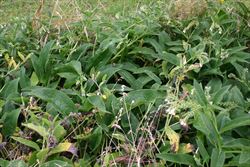
infestation (Photo: Trevor James)

habit (Photo: Sheldon Navie)
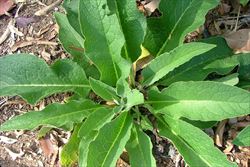
basal rosette of lower leaves (Photo: Sheldon Navie)
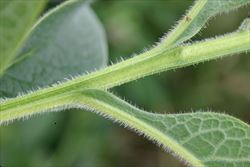
close-up of hairy stem showing the narrow wings originating at the base of the leaf blades (Photo: Trevor James)
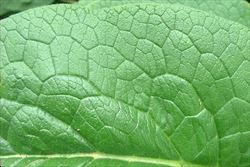
close-up of prominent veins on upper leaf surface (Photo: Sheldon Navie)
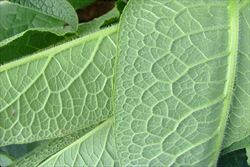
hairy leaf undersides (Photo: Sheldon Navie)
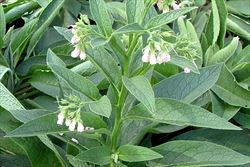
upper leaves and flower clusters (Photo: Sheldon Navie)

tubular flowers (Photo: Sheldon Navie)
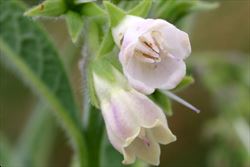
close-up of flowers (Photo: Trevor James)
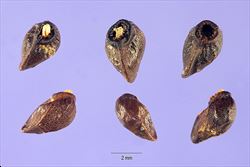
close-up of seeds (Photo: Steve Hurst at USDA PLANTS Database)
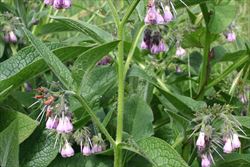
the very similar Russian comfrey (Symphytum x uplandicum), without wings on its stems (Photo: Trevor James)

Prickly comfrey (Symphytum asperum), the other parent of Russian comfrey (Symphytum x uplandicum), with reddish flower buds (Photo: Greg Jordan)
Scientific Name
Symphytum officinale L.
Synonyms
Symphytum officinale L. subsp. officinale
Family
Boraginaceae
Common Names
boneset, comfrey, common comfrey, consound, English comfrey, healing herb, knit bone, knitbone, medicinal comfrey, slippery root
Origin
Native to Europe (i.e. the UK, Austria, Belgium, Czechoslovakia, Germany, Hungary, the Netherlands, Poland, Switzerland, Belarus, Moldova, Ukraine, western Russia, Bulgaria, Italy, Romania, Yugoslavia, France and Spain) and western Asia (i.e. Turkey, southern Russia and Kazakhstan).
Naturalised Distribution
Naturalised in some parts of south-eastern and eastern Australia (i.e. in Victoria and in some coastal and sub-coastal districts of New South Wales). Also sparingly naturalised in the cooler parts of south-eastern Queensland and possibly naturalised in south-western Western Australia.
Also widely naturalised in North America (i.e. Canada and the USA).
Notes
Comfrey (Symphytum officinale) is regarded as an environmental weed in Victoria.

